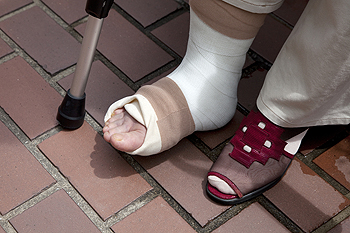 If you have fallen or dropped a heavy object on your foot, the result may be a broken foot. There are typically noticeable symptoms that are associated with this condition, and these may include severe pain and discomfort that is felt while attempting to walk, and possible swelling and bruising. If the fracture is severe, and appears to be dislocated, it may be a result of bones that are out of alignment. Patients who have medical conditions which may include diabetes or peripheral neuropathy, may not notice if their foot is fractured, and this may be a result of a loss of sensation. Once a proper diagnosis is performed, which typically consists of having an X-ray taken, the correct treatment can begin. This may include resting and elevating the foot as often as possible, and wearing a cast or protective boot while the healing process takes place. For more severe fractures, an MRI might be a necessary test to aid in determining the severity of the fracture. If you feel you have broken your foot, it is suggested that you consult with a podiatrist as quickly as possible so the proper treatment can begin.
If you have fallen or dropped a heavy object on your foot, the result may be a broken foot. There are typically noticeable symptoms that are associated with this condition, and these may include severe pain and discomfort that is felt while attempting to walk, and possible swelling and bruising. If the fracture is severe, and appears to be dislocated, it may be a result of bones that are out of alignment. Patients who have medical conditions which may include diabetes or peripheral neuropathy, may not notice if their foot is fractured, and this may be a result of a loss of sensation. Once a proper diagnosis is performed, which typically consists of having an X-ray taken, the correct treatment can begin. This may include resting and elevating the foot as often as possible, and wearing a cast or protective boot while the healing process takes place. For more severe fractures, an MRI might be a necessary test to aid in determining the severity of the fracture. If you feel you have broken your foot, it is suggested that you consult with a podiatrist as quickly as possible so the proper treatment can begin.
A broken foot requires immediate medical attention and treatment. If you need your feet checked, contact Dr. David Ungar from Personal Foot Care. Our doctor can provide the care you need to keep you pain-free and on your feet.
Broken Foot Causes, Symptoms, and Treatment
A broken foot is caused by one of the bones in the foot typically breaking when bended, crushed, or stretched beyond its natural capabilities. Usually the location of the fracture indicates how the break occurred, whether it was through an object, fall, or any other type of injury.
Common Symptoms of Broken Feet:
- Bruising
- Pain
- Redness
- Swelling
- Blue in color
- Numbness
- Cold
- Misshapen
- Cuts
- Deformities
Those that suspect they have a broken foot shoot seek urgent medical attention where a medical professional could diagnose the severity.
Treatment for broken bones varies depending on the cause, severity and location. Some will require the use of splints, casts or crutches while others could even involve surgery to repair the broken bones. Personal care includes the use of ice and keeping the foot stabilized and elevated.
If you have any questions please feel free to contact our office located in Farmington, MI . We offer the newest diagnostic and treatment technologies for all your foot and ankle needs.

